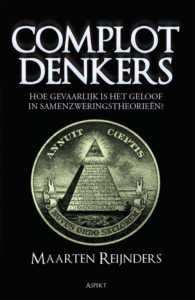
During its 1 October symposium, the Dutch Society against Quackery, Vereniging tegen de Kwakzalverij, will announce who has won this year’s Master Quack Award (Meester Kackadorisprijs). Nominated are:
- The Donders Institute at Radboud University Nijmegen
Because of a bad dissertation on acupuncture. See also
Acupunctuurpromotie RU: niet meer dan placebo-effect volgens promotor Coenen (Dutch) - Jeanine Hennis-Plasschaert, Minister of Defence
Military personnel has, without their knowledge, been given a health insurance, where alternative care has been included in basic care. - Dutch Royal Society for Veterinary Medicine (KNMvD)
The organisation lets alternatively operating vets, united in the Study Group for Complementarily Operating Vets, practice freely. Nominated for the third time. - André Rouvoet, chair of VEKTIS
VEKTIS registers alternative healthcare providers, which they require in order to be eligible for compensation by health insurance companies. According to the Society, VEKTIS’ assessment procedure is a farce.
- Huub Savelkoul, professor at Wageningen University
Nominated for a second time, this year for his cooperation to a course on ‘orthomolecular dietetics’.
The prize is meant for the institute, person or enterprise that has contributed most to the spread of quackery in the Netherlands last year by means of act, word or writing. On skeptical blog KloptDatWel.nl, you can vote for whom you think should receive the 2016 ironic award until Friday 16:00 CET.

 Dutch journalist Maarten Reijnders wrote a book about the currently most popular and (in)famous conspiracy theories and their proponents in the Netherlands. The book, titled Complotdenkers – Hoe gevaarlijk is het geloof in samenzweringstheorieën? (‘Conspiracists – How dangerous is belief in conspiracy theories?’) was deliberately published on 11 September 2016, because the 9/11 Truth movement is one of the most prominent of these phenomena in Western society at the moment. Skeptic Pepijn van Erp wrote a review; here is an excerpt:
Dutch journalist Maarten Reijnders wrote a book about the currently most popular and (in)famous conspiracy theories and their proponents in the Netherlands. The book, titled Complotdenkers – Hoe gevaarlijk is het geloof in samenzweringstheorieën? (‘Conspiracists – How dangerous is belief in conspiracy theories?’) was deliberately published on 11 September 2016, because the 9/11 Truth movement is one of the most prominent of these phenomena in Western society at the moment. Skeptic Pepijn van Erp wrote a review; here is an excerpt: